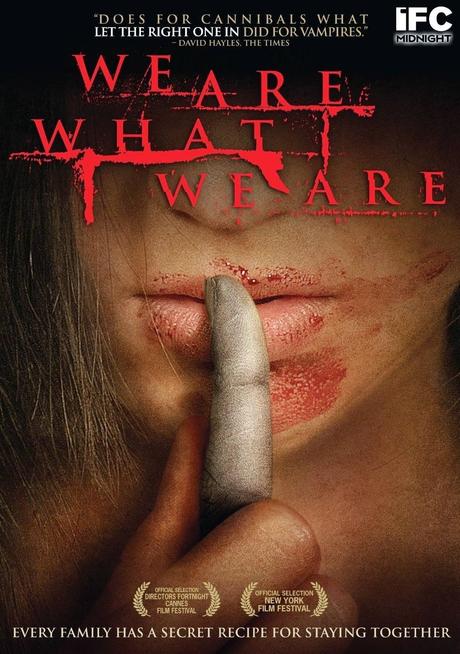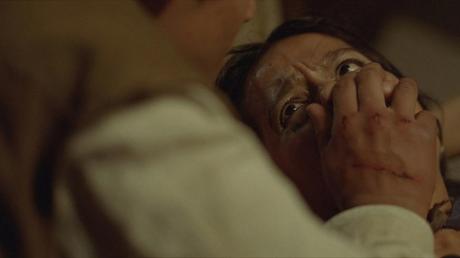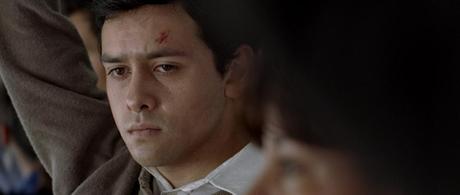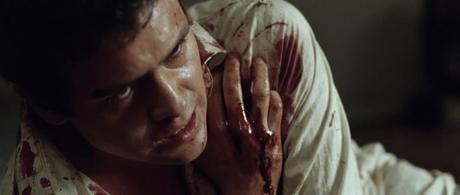 Family values takes a whole new meaning in Jorge Michel Grau's eerie cannibalism thriller "We Are What We Are," and the movie takes on several layers of meaning. Sexual politics and bodily mutilation take the front wheel in this nightmarish horror film, and no one is safe. When the patriarch of a strange, impoverished family in Mexico dies dramatically, the bereaved are compelled to carry on as they always have. But this time 'carrying on' doesn't mean washing clothes, commuting to work, and buying groceries- Father's clan is a family of cannibalistic killers, and someone must take the job of hunting their human prey.
Family values takes a whole new meaning in Jorge Michel Grau's eerie cannibalism thriller "We Are What We Are," and the movie takes on several layers of meaning. Sexual politics and bodily mutilation take the front wheel in this nightmarish horror film, and no one is safe. When the patriarch of a strange, impoverished family in Mexico dies dramatically, the bereaved are compelled to carry on as they always have. But this time 'carrying on' doesn't mean washing clothes, commuting to work, and buying groceries- Father's clan is a family of cannibalistic killers, and someone must take the job of hunting their human prey.While Mother (Carmen Beato) locks herself in the room and falls apart, her two sons- impulsive, violent Julien (Alan Chávez) and the more methodical, repentant Alfredo (Francisco Barreiro) squabble and their beautiful sister Sabina (Paulina Gaitan) plays them against each other. Alfredo laments that his mother never liked him and tries to prove himself to the others, while Julien, a loose cannon, postures and puts his family in grave danger with his recklessness.
 Meanwhile, two somewhat corrupt cops track the family, after a gory incident involving a prostitute threatens to put their strange lifestyle on display. The film builds tension with spooky cinematography and a nerve-wracking violin score akin to "The Shining." The acting is superior from the entire cast, especially Paulina Gaitin and Francisco Barreiro (who is also a cutie- I look forward to seeing him in "Here Comes The Devil."
Meanwhile, two somewhat corrupt cops track the family, after a gory incident involving a prostitute threatens to put their strange lifestyle on display. The film builds tension with spooky cinematography and a nerve-wracking violin score akin to "The Shining." The acting is superior from the entire cast, especially Paulina Gaitin and Francisco Barreiro (who is also a cutie- I look forward to seeing him in "Here Comes The Devil."The first scene is a haunting study of disenfranchisement- as Father (Humberto Yáñez) wanders the streets and stops before a display of mannequins, he falls to the ground and begins to spit up blood. After dying in the street, he is nonchalantly cleaned up along with his blood, and steadfastly ignored by passersby, as the violins on the soundtrack shriek. This sets the tone for a grim and bloody picture that is sadly underrated by the public.
There is recurring theme of women in low-class situations asserting power as best they can- Sabina manipulates her two brothers with her gentle words and her gorgeous body, while mother attempts to maintain control of her sons. And the prostitutes... well, you'll have to see how that turns out. More disturbing than the graphic violence is the dehumanizing way the family talks about their victims (they're 'whores' and 'faggots,' never people.) More disturbing still is the way you start to root for the family, ever so slightly, before you can stop yourself. They suck you into their world, and things you know are wrong seem intriguing.

The 5.7 rating of this movie on Imdb makes me sad. I only checked the clock once during "We Are What We Are," and that was when my sister asked from the other room how much was left. This movie was engrossing and not boring at all, and I thoroughly enjoyed watching it. I love how foreign horror films don't feel the need to reveal everything in the first five minutes. It is compared to "Let the Right One In" on the back of the box. Well, I wouldn't call it better ("Let the Right One In" is my favorite movie,) but it was well-made and highly enjoyable. A creepy slow-burner of a horror film.
Rating-8.0/10

